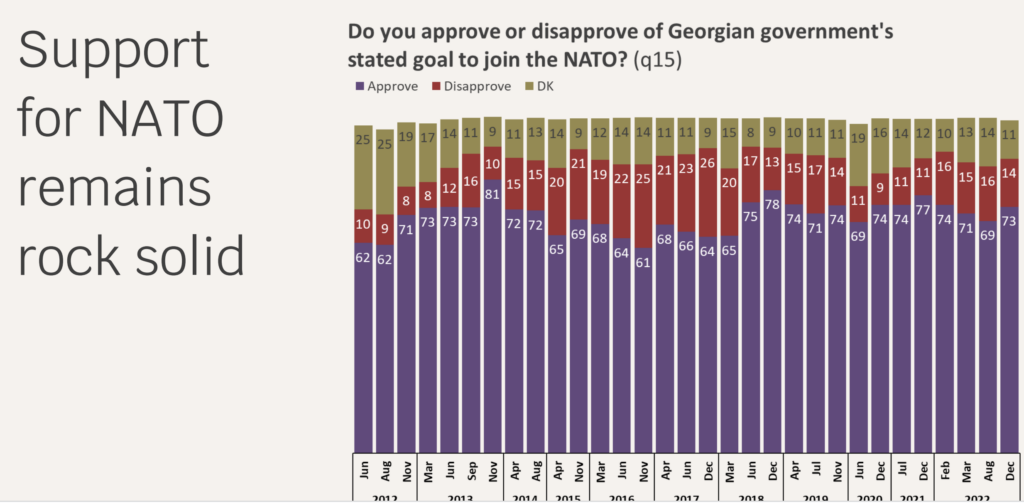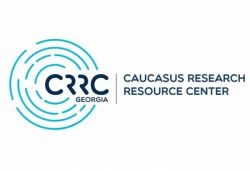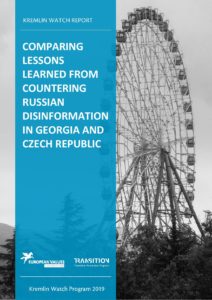Fistfights broke out among Georgian lawmakers on Monday as a parliamentary committee debated a bill on “foreign agents” which critics say is modelled on draconian legislation in neighboring Russia, Reuters reports:
Video from inside the parliament building in the capital Tbilisi showed a brief but violent brawl between lawmakers after the chairman of the chamber’s legal affairs committee appeared to strike the leader of the United National Movement opposition party, which opposes the bill….Last month, more than 60 civil society organizations and media outlets said they would not comply with the new “foreign agent” legislation if it becomes law.
“The Russian legislation that now is proposed in parliament is against Georgia’s national interests, against our European aspirations,” said Irakli Pavlenishvili, a civil rights activist and opposition politician. 
The Biden administration is “deeply troubled by the introduced foreign agents law, precisely because it would stigmatize and silence independent voices and citizens of Georgia,” said U.S. State Department spokesman Ned Price. “We are deeply concerned about the potential implications of this law for freedom of speech and democracy in Georgia.”
Irakli Kobakhidze, the chair of Georgian Dream, recently accused the Washington-based National Endowment for Democracy (NED) and the EU-supported European Endowment for Democracy (EED) of financially supporting ‘extremism and polarization’ in Georgia.
 Georgian citizens remain strongly pro-Western and the majority do not believe that concessions will help avoid war with Russia, according to a recent NED-funded survey by the National Democratic Institute (NDI) and the Caucasus Research Resource Centers (CRRC):
Georgian citizens remain strongly pro-Western and the majority do not believe that concessions will help avoid war with Russia, according to a recent NED-funded survey by the National Democratic Institute (NDI) and the Caucasus Research Resource Centers (CRRC):
54% of the respondents believe that Georgia will get more benefits from joining the European Union and NATO; 16% think that the country will benefit from rejecting them; 16% do not agree with either opinion, while 14% did not know or refused to answer. 73% of respondents believe that EU membership will help Georgia’s economic development, and 48% think that NATO membership will be a precondition for restoring territorial integrity.
Tornike Sharashenidze, professor at the Georgian Institute of Public Affairs (GIPA), says that the Russian invasion of Ukraine is the key element in anti-Western rhetoric. “The government’s official version is that Georgia was pushed to open a second front against Russia, but we didn’t do this, and that’s why we were denied EU candidate status. They play on people’s fear of war really well,” he tells Deutsche Welle.
But despite the fear of war, support for EU and NATO membership is steadily rising — 81%, as indicated in NDI polls, DW adds. EU and NATO membership is seen as the top priority for Georgians given the country’s complicated history with Russia, which occupied 20% of its territory in the 2008 war.
As a former U.S. ambassador to Moscow, Michael McFaul noted recently in our pages, a successful democracy in Georgia or Ukraine was anathema to everything Russia’s Vladimir Putin stood for. “Putin feared the color revolutions in Georgia and Ukraine precisely because they threatened the legitimacy and stability of his autocracy in Russia,” The Post adds:
 Georgia’s former leader Mikheil Saakashvili is imprisoned in Georgia, his health deteriorating, and the goals of European integration are slipping away. On Feb. 15, the European Parliament approved a resolution 577-33 calling on the authorities in Georgia to release him and warning that his case “is a litmus test for the Georgian government’s commitment to European values and its declared European aspirations, including E.U. candidate status.”
Georgia’s former leader Mikheil Saakashvili is imprisoned in Georgia, his health deteriorating, and the goals of European integration are slipping away. On Feb. 15, the European Parliament approved a resolution 577-33 calling on the authorities in Georgia to release him and warning that his case “is a litmus test for the Georgian government’s commitment to European values and its declared European aspirations, including E.U. candidate status.”
Ever since Georgian Dream won elections for the parliament and then president in 2012 and 2013, respectively, Georgia has fallen under the influence of billionaire Bidzina Ivanishvili, who made his fortune in Russia and served for a year as Georgian prime minister, note David J. Kramer, executive director of the George W. Bush Institute, and Ian Kelly, a former U.S. ambassador to Georgia and the OSCE. Ivanishvili is widely seen as the power behind the government throne, despite claiming that he was done with politics. And the country has fallen more deeply under the Kremlin’s influence and distanced itself from the West.
 Borrowing a page from the Kremlin playbook, the Georgian parliament is on the verge of passing legislation that would brand civil society organizations (nonprofit advocacy organizations) that receive more than 20 percent of their funding from outside the country “foreign agents,” they wrote for The Hill. Given the lack of domestic donors, due in part to their fear of getting crosswise with the government, many such organizations are increasingly reliant on outside largesse to survive.
Borrowing a page from the Kremlin playbook, the Georgian parliament is on the verge of passing legislation that would brand civil society organizations (nonprofit advocacy organizations) that receive more than 20 percent of their funding from outside the country “foreign agents,” they wrote for The Hill. Given the lack of domestic donors, due in part to their fear of getting crosswise with the government, many such organizations are increasingly reliant on outside largesse to survive.







